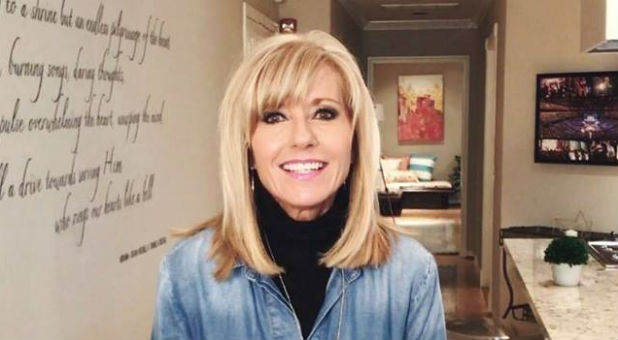[ad_1]

Join us on our podcast each weekday for an interesting story, well told, from Charisma News. Listen at charismapodcastnetwork.com.
“Me, too.”
These two words may flood social media newsfeeds today as women and men speak up about a time they were sexually harassed or assaulted.
The movement birthed out of the Harvey Weinstein scandal and prove horrifying statistics aren’t just numbers, but neighbors, friends and family.
According to Atlantic Training, about 1 in 3 women between the ages or 18-34 has been sexually harassed at work, and 81 percent of women have been verbally sexually harassed (jokes, name-calling and so on).
Lest you think the church is immune to the problems of the secular world, take a look at the reality of some of today’s prominent Christian women:
11.
— Beth Moore (@BethMooreLPM) Oct. 16, 2017
A well meaning mentor told me at 25 that people couldn’t handle hearing about sexual abuse and it would sink my ministry. It didn’t. #MeToo
— Beth Moore (@BethMooreLPM) Oct. 16, 2017
There’s no way on earth for me to move on to a new subject quickly after that barrage of #MeToo hashtags. So, I’d like to offer some #WeToo:
— Beth Moore (@BethMooreLPM) Oct, 16, 2017
#MeToo https://t.co/EWAduXa8ga
— Karen Swallow Prior (@KSPrior) Oct. 15, 2017
I realized why I hadn’t been particularly struck by #MeToo.
It’s because I assume every woman I know has been hollered at, grabbed, insulted, objectified, or violated at some point.
It’s terrible that that’s the norm. And me too.
— kate shellnutt (@kateshellnutt) Oct. 16, 2017
Just a thought: You cannot claim to have a robust doctrine of sin, or the cross, while disbelieving the pervasiveness of #metoo.
— Sharon Hodde Miller (@SHoddeMiller) Oct. 16, 2017
#MeToo: I was raped by my pastor https://t.co/qgky4jGb57 From @hgscott
— Sarah Pulliam Bailey (@spulliam) October 16, 2017
An article in Vice even claims that the church fosters this kind of harassment and abuse.
Author James Nolan writes:
In reality, “religion” is a generalized term. Better to specify what kind of religion—or, better still, what kind of culture—fosters it, and how there are varying degrees. Janet Heimlich, one of the world’s foremost authors on the topic and writer of the book Breaking Their Will: Shedding Light on Religious Child Maltreatment, says children are more vulnerable to abuse and neglect if they live in religious authoritarian cultures.
“There are three perfect-storm factors that identify a religious culture or community as authoritarian: One, the culture has a strict, social hierarchy. Two, the culture is fearful. And three, the culture is separatist,” she told the Huffington Post in 2011. “The more intense these three factors are—the more authoritarian the culture is – the more likely children will be harmed.” …
“Part of what has allowed abuses to continue unabated so long in very large religious institutions, such as the Methodist Church and others, is the power they have over congregants,” Heimlich told me. “They have the power to not only convince them they should not report abuses to outside authorities, but to tithe [give money]. These institutions also have power over politicians, who can be lobbied to keep statutes of limitations short, which, of course, benefits the institutions financially and keeps cases of abuse hidden from the public eye because survivors don’t get their day in court.”
With high-profile cases of Christians suffering sexual indiscretion, it can be difficult to disagree with Heimlich’s thoughts.
Evangelical author and professor Karen Swallow Prior summarizes the pervasiveness of the problem like this:
One expert estimates that between 1 percent and 5 percent of the population molest children. This means that if you know 100 adults, chances are good that at least one of them is a child molester. Maybe more. There is no evidence to suggest that the church population differs significantly in reflecting the general population.
Of course, accepting the commonness of the problem does not mean accepting the problem. It is with sexual abuse as it is with a dog’s jumping: it should be neither shocking nor tolerated.
Nor does opening our eyes to the problem mean we should establish a battery of fear-based rules and regulations for young people and for those that serve them. Rather, we must be fiercely communicative, open, vigilant and wise. We need to understand the fact that abusers, potential abusers and their victims are all around us. There is no need to adopt a culture of fear, suspecting anyone whose hand we shake at Sunday morning worship is a thief—but we don’t leave our wallets unattended in the robe room either.
So what’s the church to do?
![]()
Jessilyn Justice is the director of online news for Charisma. Born and raised in a pastor’s family in Alabama, she attended Lee University and the Washington Journalism Center. She’s passionate about sharing God’s goodness through storytelling. Tell her what you think of this story on Twitter @jessilynjustice.
Readers are Leaders! Subscribe now and get 3 magazines for the price of 1. Get Charisma, Ministry Today and SpiritLed Woman all for $24. YES – Sign me up!
3 Reasons Why you should read Life in the Spirit. 1) Get to know the Holy Spirit. 2) Learn to enter God’s presence 3) Hear God’s voice clearly! Click here to draw closer to God!
[ad_2]
Source link
